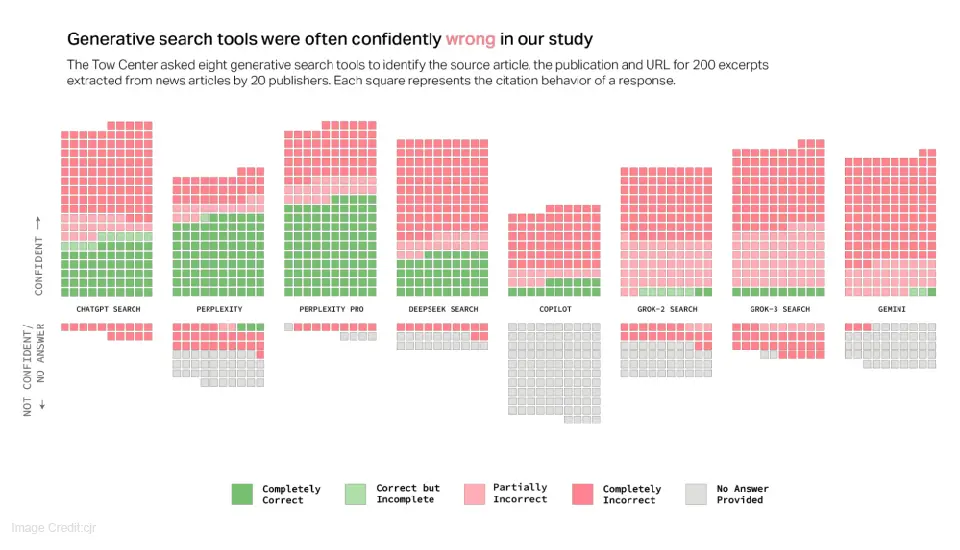How Often Do You Rely on AI for Answers?
Think about the last time you searched for information online. Did you type it into Google, or did you ask ChatGPT, Perplexity, or another AI-powered tool? You’re not alone—according to recent data, over 50% of internet users now rely on AI-generated responses instead of traditional search engines.
But here’s the catch: a study by the Columbia Journalism Review (CJR) found that AI search engines provide incorrect answers 60% of the time.
That’s 6 out of every 10 answers you get from AI that could be misleading, inaccurate, or outright false.
So, how much of what you “know” from AI is actually wrong?
Breaking Down the Numbers: How AI Search Engines Fail Users
The study analyzed 8 major AI search engines, including Google’s AI Overviews, Perplexity, and OpenAI’s ChatGPT.

Here’s what they found:
🔴 60% of AI-generated answers contained factual inaccuracies.
🔴 25% of the time, AI responses failed to provide any sources at all.
🔴 When sources were cited, 50% of them were misattributed or incorrect.
One of the biggest issues is that AI search engines often hallucinate facts—making up information that sounds convincing but has no basis in reality. Imagine asking for legal advice, medical information, or financial guidance and getting wrong answers 6 out of 10 times. The consequences could be serious.
AI Search Engines Are Ignoring Publishers’ Rights
Beyond misinformation, AI search engines are also facing backlash from publishers. The study found that many AI tools scrape content from websites—even those that explicitly opted out. This means AI is using information without permission, sometimes distorting or misrepresenting it.
For instance, The New York Times and other major news outlets have blocked AI bots from accessing their content due to concerns over inaccurate citations and copyright violations. Despite this, AI search tools continue to pull content from these sources, often without crediting them properly.
What Does This Mean for You?
If you use AI for answers, here’s why you should be cautious:
✅ Misinformation can spread fast. False AI-generated facts can go viral before anyone realizes they’re wrong.
✅ Your trust in AI could be misplaced. AI doesn’t “know” facts—it predicts likely answers based on patterns in data, meaning it can easily be wrong.
✅ Not all sources are reliable. AI search engines often fail to distinguish between credible news sources and user-generated content with no fact-checking.
How to Protect Yourself from AI Misinformation
1️⃣ Double-check AI answers with trusted sources. Always verify information with reputable news sites, academic sources, or official organizations.
2️⃣ Use AI for brainstorming, not facts. AI is great for summarizing information but should not be your only source for critical knowledge.
3️⃣ Be wary of AI hallucinations. If something sounds odd, look it up manually before believing it.
Final Thoughts: Can AI Search Engines Be Trusted?
AI-powered search engines are revolutionizing how we find information, but with a 60% error rate, they are far from perfect. As AI technology continues to evolve, users need to stay vigilant and not blindly trust everything AI-generated content tells them.
Before you accept an AI answer as fact, ask yourself: Could this be wrong? Because, statistically speaking, there’s a 6 in 10 chance that it is. 🚨





